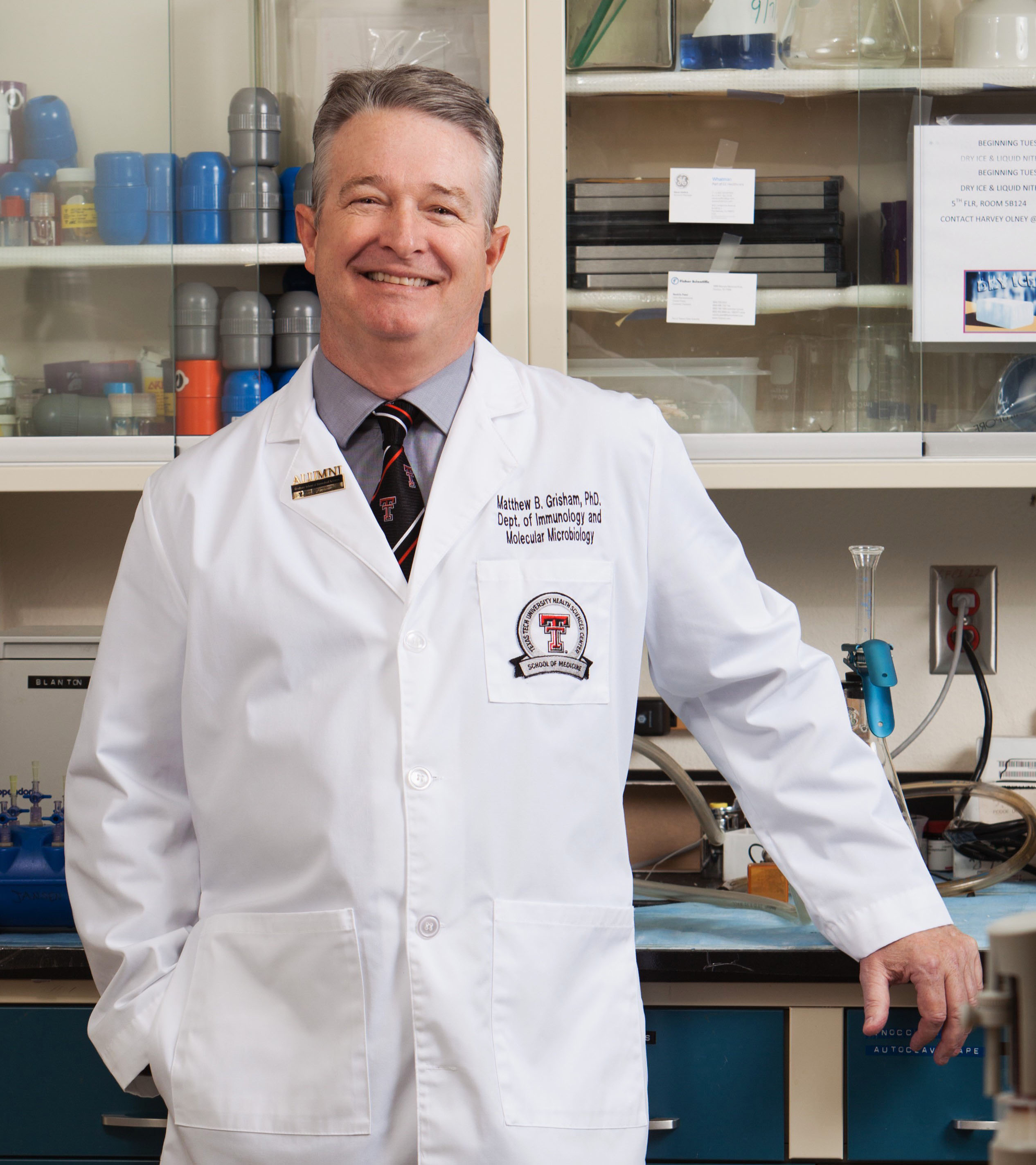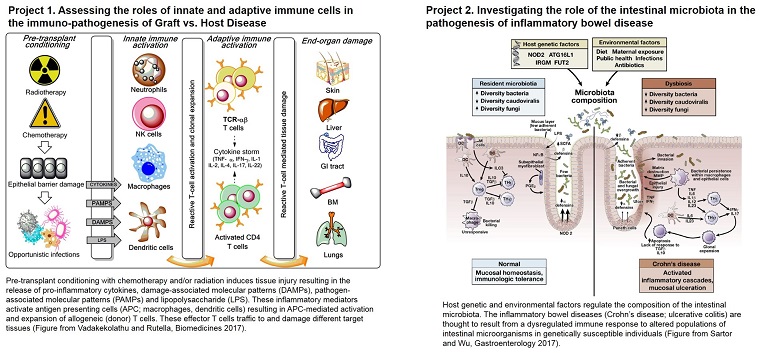Matthew Grisham, PhD

Matthew Grisham, Ph.D.
Professor Emeritus
Email:Matthew.Grisham@ttuhsc.edu
Phone: 806-743-2598
Education
Post-Doctoral Fellowship: St. Jude Children's Research Hospital, Memphis, 1984
PhD: Texas Tech University Health Sciences Center, Lubbock, 1982
BA: University of South Florida, Tampa, 1975
Biography
Matthew B. Grisham is a Professor Emeritus in the Department of Immunology and Molecular
Microbiology and the Vernon and Elizabeth Haggerton Chair in Gastroenterology at Texas
Tech University Health Sciences Center (TTUHSC). Dr. Grisham received his PhD in Biochemistry
from TTUHSC in 1982. Following graduation, Dr. Grisham moved to St. Jude Children’s
Research Hospital to pursue postdoctoral training in immunology and inflammation.
In 1984, he was recruited to the University of South Alabama College of Medicine in
Mobile where he assumed the position of Assistant Professor in the Department of Biochemistry.
Three years later, he was recruited to the Department of Molecular and Cellular Physiology
at LSU Health Sciences Center (LSUHSC) where he rose through the ranks achieving the
position of Professor and Associate Director of the Center of Excellence for Arthritis
and Rheumatology. In 2004, Dr. Grisham was awarded the Boyd Professorship by the LSU
System. The Boyd Professorship is the highest academic rank that can be bestowed upon
a faculty member within the Louisiana State University System. Following his 25 year
tenure at LSUHSC, Dr. Grisham was recruited to TTUHSC in 2012 where he assumed his
current position. Dr. Grisham’s research has focused on defining the molecular, cellular
and immunological mechanisms responsible for the chronic inflammatory tissue injury
observed in animal models of the inflammatory bowel diseases (e.g. Crohn’s disease
and ulcerative colitis). More recently, his laboratory has begun to explore the role
of different T cell subsets in the immuno-pathogenesis of acute graft versus host
disease.
His research has been continuously funded for the past 28 years by research awards
from the National Institutes of Health (NIH) and more recently by the Department of
Defense. In addition to his federal funding, Dr. Grisham has received research grants
from several different funding agencies and foundations as well as biotechnology and
pharmaceutical companies. He has published 294 articles in peer-reviewed journals,
75 book chapters, edited two books and written one book. Dr. Grisham has received
numerous honors and awards during his career including the Distinguished Alumni Award
from TTUHSC, the Dean’s Scholarship/Research Award from TTUHSC, the President’s Excellence
in Research Award from TTUHSC, the Vernon and Elizabeth Haggerton Chair in Gastroenterology
at TTUHSC and the Boyd Professorship. Dr. Grisham has also held numerous national
and international leadership positions during his career including his service as
the President of the Society for Free Radical Biology and Medicine, President of the
Gulf Coast Physiological Society, Chair of the Gastrointestinal and Liver Section
of the American Physiological Society (APS), Chair of the Gordon Conference on Oxygen
Radicals, Co-Chair of the APS-sponsored Symposium on Experimental and Clinical Inflammatory
Bowel Disease and Co-Chair of the Basic Research Single Topic Conference for the American
Association for the Study of Liver Diseases.
Research Interests:

Current and Former Students & Postdocs:
Ph.D Students:
- Yan Chen, MD, PhD. 1996
Private medical practice. - Ian Hines, PhD. 2002
Associate Professor; Department of Nutritional Sciences; East Carolina University - F. Steven Laroux, PhD. 2003
Director, Inflammatory Diseases and Immunology; ViThera Pharmaceuticals, Inc. - Dmitry Ostanin, PhD. 2006
Senior Staff Scientist, Immunology and Inflammation; Bristol Myers Squibb, Inc. - Yuri Koboziev, PhD. 2011
Research Assistant Professor, Department of Nutritional Sciences; Texas Tech University - Fridrik Karlsson, PhD. 2011
Principal Scientist; T Cell Immunology; Pfizer, Inc. - Cynthia Reinoso Webb, PhD. 2017
Staff scientist;The Bioterrorism Response Lab; Institute of Environmental and Human Health at Reese Technology Center
MS Students:
- David Kang, MS. 1997
Business Manager, Boston, MA. - F. Stephen Laroux, MS. 2000
Director, Inflammatory Diseases and Immunology; ViThera Pharmaceuticals, Inc. - Jason Hoffman, MS. 2005
Clinical Laboratory Technician, LSU Health, Shreveport, LA. - Kathryn Furr, MS. 2006
Laboratory Manager, Department of Immunology and Molecular Microbiology, Texas Tech University Health Sciences Center. - Kevin Bass, MS. 2017
Medical student, Texas Tech University Health Sciences Center.
Post-Doctoral Training:
- Tamaki Yamada, M.D 1991-93
Okazaki City Medical Center, Japan - Elaine Conner, Ph.D. 1996-98.
Research Advisor, Antibody Discovery, Eli Lilly, Inc. - Allen Miles, Ph.D. 1995-97.
Professor, Grambling State University - Satoshi Aiko, M.D.1997-99.
Professor, Keio University Medical School, Japan - Mercedes Fernandez, PhD. 1998-99.
Senior Group Leader in Liver Disease; IDIBAPS Research Institute, Spain - David Jourd'heuil, PhD. 1997-99
Professor, Albany Medical College, NY - Zenichi Morise, M.D. 1998-2000.
Professor Keio University, Japan - Shigeyuki Kawachi, M.D. 2000-02.
Professor Keio University, Japan - Hirohisa Harada, M.D. 2001-03.
Tokyo Dental College, Japan - Kevin Pavlick, PhD. 2002-05.
Co-Founder and COO, Innolyzer Labs, L.L.C; Shreveport, LA. - Hidejiro Urakami, MD. 2003-06.
Staff Physician, National Hospital Tokyo Medical Center, Japan - Dmitry V. Ostanin, PhD. 2006-09.
Senior Staff Scientist, Immunology and Inflammation; Bristol Myers Squibb, Inc. - Yuta Abe, M.D. 2009-11.
Professor, Keio University Medical School, Japan - Koichi Takebayashi, MD. 2008-09.
Staff Physician, Japan Self Defense Force Hospital, Japan - Iurii Koboziev, PhD. 2011-15.
Research Assistant Professor, Department of Nutritional Sciences; Texas Tech University - Cecily Haley, PhD. 2012-13.
Teacher, J. Frank Dobie High School, Houston, TX.
Selected Publications
- Reinoso-Webb, C., den Bakker, H., Koboziev, I., Jones-Hall, Y., Kottapalli, KR, Ostanin, D.V., Furr, K., Mu, Q., Luo, X. and Grisham, M.B., 2017. Differential Susceptibility to T Cell-Induced Colitis in Mice: Role of the Intestinal Microbiota. Inflammatory Bowel Diseases (In Press).
- Reinoso-Webb. C., Koboziev,I., Furr,K.L., and Grisham,M.B. 2016. Protective and pro-inflammatory roles of intestinal bacteria. Pathophysiology. 23:67-80.
- Fang,K., Grisham,M.B., and Kevil,C.G. 2015. Application of Comparative Transcriptional Genomics to Identify Molecular Targets for Pediatric IBD. Front Immunol. 6:165.
- Koboziev,I., Jones-Hall,Y., Valentine,J.F., Webb,C.R., Furr,K.L., and Grisham,M.B. 2015. Use of Humanized Mice to Study the Pathogenesis of Autoimmune and Inflammatory Diseases. Inflamm. Bowel Dis. 21:1652-1673.
- Kurmaeva,E., Lord,J.D., Zhang,S., Bao,J.R., Kevil,C.G., Grisham,M.B., and Ostanin,D.V. 2014. T cell-associated alpha4beta7 but not alpha4beta1 integrin is required for the induction and perpetuation of chronic colitis. Mucosal Immunol.7:1354-1365.
- Koboziev,I., Reinoso,W.C., Furr,K.L., and Grisham,M.B. 2014. Role of the enteric microbiota in intestinal homeostasis and inflammation. Free Radic. Biol. Med. 68:122-133.
